- On the Waterfront (1954)
- The Godfather (1972)
- A Streetcar Named Desire (1951)
- Apocalypse Now (1979)
- One-Eyed Jacks (1961)
- Burn! (1969)
- Bedtime Story (1964)
- The Wild One (1953)
- Roots: The Next Generations (1979)
- Don Juan DeMarco (1962)
- Mutiny on the Bounty (1962)
- The Nightcomers (1971)
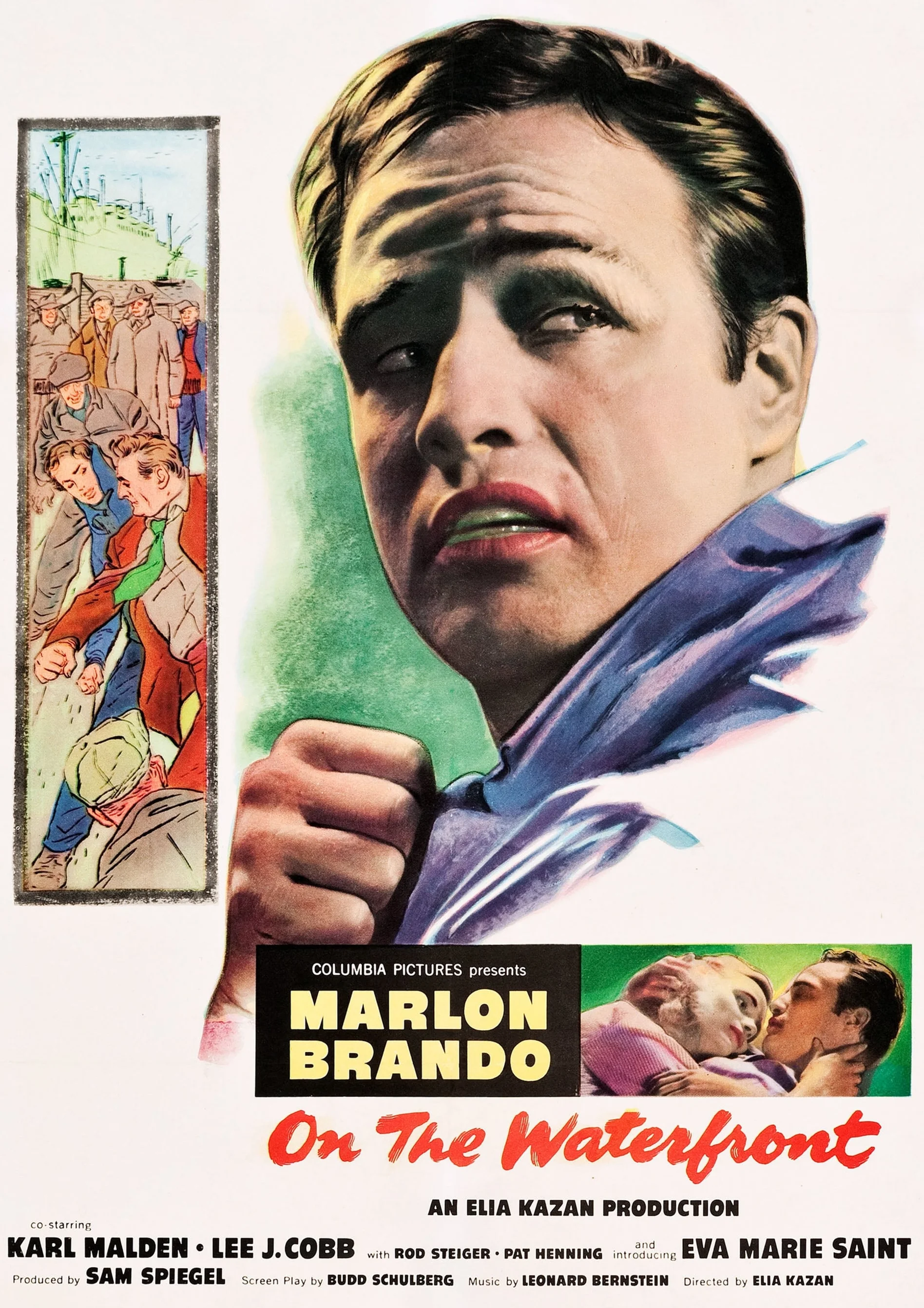 On the Waterfront is one of the most important, influential films made. Because of what Marlon Brando did,
the landscape of acting had been forever changed. There are many outstanding scenes, but the greatest of them all
is the taxicab scene. It's as good as acting will ever be. A remarkable scene is when Brando played with Eva Marie
Saint's glove after it was accidentally dropped, which happened for real, and just carried on with the
conversation as if it's no big deal.
On the Waterfront is one of the most important, influential films made. Because of what Marlon Brando did,
the landscape of acting had been forever changed. There are many outstanding scenes, but the greatest of them all
is the taxicab scene. It's as good as acting will ever be. A remarkable scene is when Brando played with Eva Marie
Saint's glove after it was accidentally dropped, which happened for real, and just carried on with the
conversation as if it's no big deal.
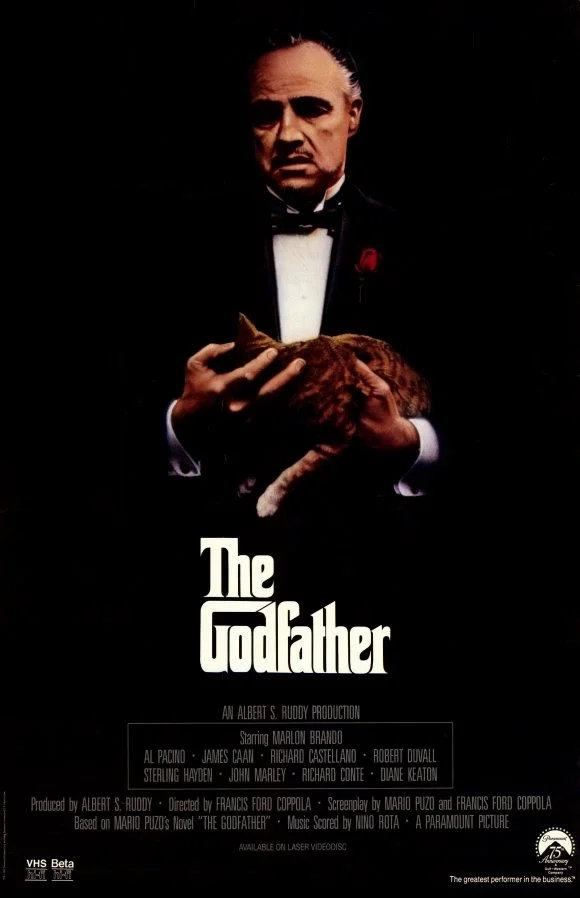 There's no The Godfather without Marlon Brando. After appearing in so many flops in a row, he made the
greatest comeback of his career. But first, he had to screen test for it because the men in charge wouldn't allow
any discussion of him appearing in the film. And the rest was history including a refused Oscar for Best Actor.
Some of the lines by Brando's character are legendary such as "I'm gonna make him an offer that he can't refuse."
There's no The Godfather without Marlon Brando. After appearing in so many flops in a row, he made the
greatest comeback of his career. But first, he had to screen test for it because the men in charge wouldn't allow
any discussion of him appearing in the film. And the rest was history including a refused Oscar for Best Actor.
Some of the lines by Brando's character are legendary such as "I'm gonna make him an offer that he can't refuse."
 A Streetcar Named Desire is a landmark picture in terms of acting. Take a delicate, pretty
flower. It's all about "oh, darling," "precious things," and the likes. Now, enter an animal with his greasy paws
to tear it all up and smashes everything into pieces. That's precisely what happened between Blanche DuBois and
Stanley Kowalski in A Streetcar Named Desire, a fast, furious film that would change acting forever.
A Streetcar Named Desire is a landmark picture in terms of acting. Take a delicate, pretty
flower. It's all about "oh, darling," "precious things," and the likes. Now, enter an animal with his greasy paws
to tear it all up and smashes everything into pieces. That's precisely what happened between Blanche DuBois and
Stanley Kowalski in A Streetcar Named Desire, a fast, furious film that would change acting forever.
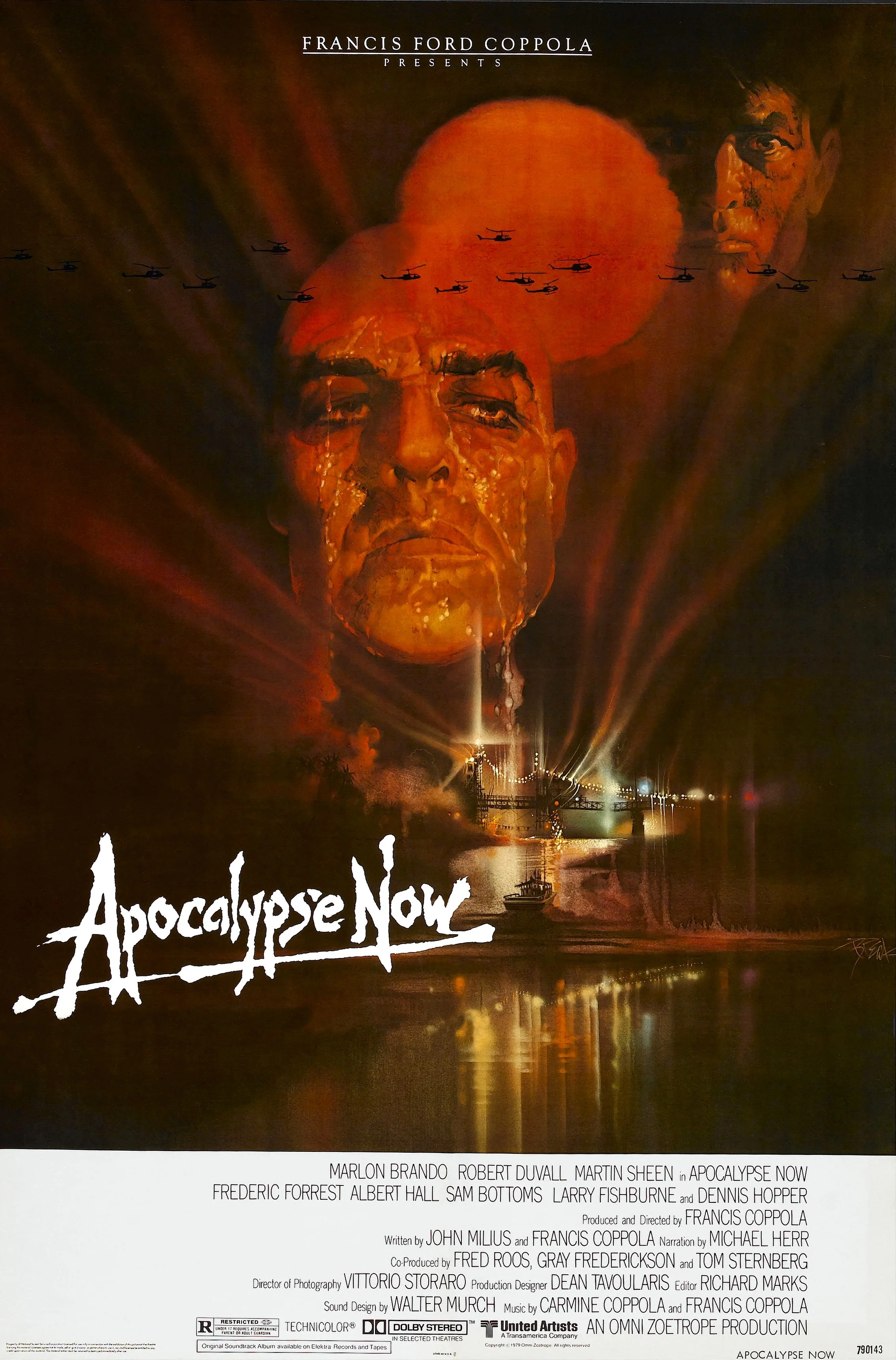 "I love the smell of napalm in the morning." That's what Apocalypse Now is about: the exploration of
insanity in the journey toward the heart of darkness. Sometimes, I think it's about the deterioration of Marlon
Brando's mind. He has some of the best lines of the film such as "You're an errand boy, sent by grocery clerks,
to collect a bill" and "The horror...the horror..."
"I love the smell of napalm in the morning." That's what Apocalypse Now is about: the exploration of
insanity in the journey toward the heart of darkness. Sometimes, I think it's about the deterioration of Marlon
Brando's mind. He has some of the best lines of the film such as "You're an errand boy, sent by grocery clerks,
to collect a bill" and "The horror...the horror..."
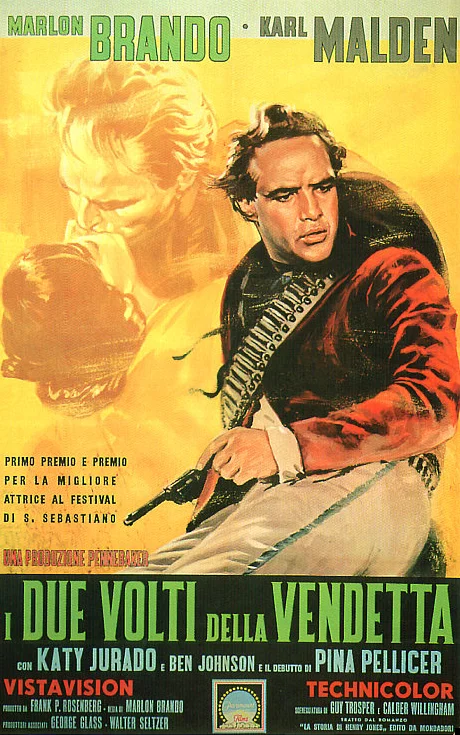 Thanks to Stanley Kubrick bowing out of the project, Marlon Brando directed only one film in his life, and it's
called One-Eyed Jacks. A Western with many twists and turns, he steals the show. Charles Lang's
Oscar-nominated cinematography is 100% excellent. There are many mind-blowing scenes such as Marlon Brando on the
sand hills and the oceanfront with the waves crashing. It's like watching a foreign film.
Thanks to Stanley Kubrick bowing out of the project, Marlon Brando directed only one film in his life, and it's
called One-Eyed Jacks. A Western with many twists and turns, he steals the show. Charles Lang's
Oscar-nominated cinematography is 100% excellent. There are many mind-blowing scenes such as Marlon Brando on the
sand hills and the oceanfront with the waves crashing. It's like watching a foreign film.
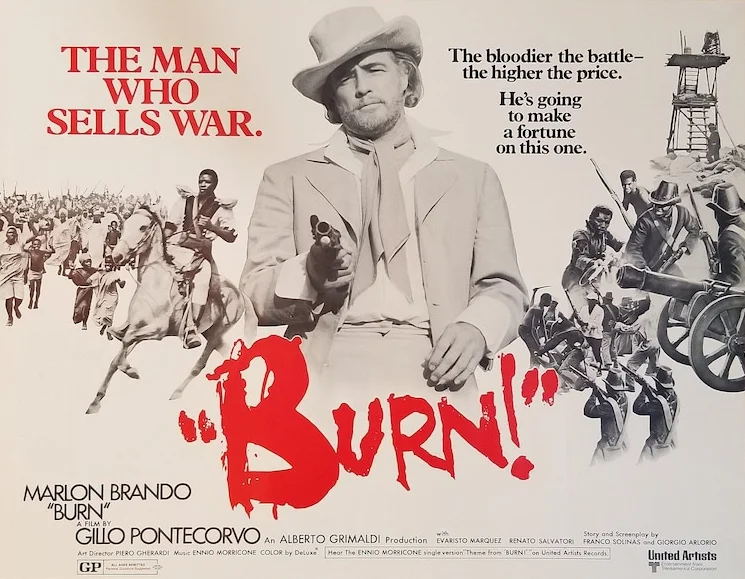 Burn! finally brings out the best in Marlon Brando, and when he gives a superlative performance, the film
is elevated to another level. Brando even admitted he did his best acting ever. It provides an excellent insight
into colonialism and how a banana republic can be formed for a Central American country.
Burn! finally brings out the best in Marlon Brando, and when he gives a superlative performance, the film
is elevated to another level. Brando even admitted he did his best acting ever. It provides an excellent insight
into colonialism and how a banana republic can be formed for a Central American country.
 Move over, Dirty Rotten Scoundrels...this is the original: Bedtime Story. David Niven is Michael
Caine, and Marlon Brando is Steve Martin. The story is the same except for the ending which is completely
different. The script is genius, that's for sure. Far better than Steve Martin, Marlon Brando is funny while his
acting is somewhere between On the Waterfront and The Godfather. Do you know why? It's because he
mastered the art of comedic timing.
Move over, Dirty Rotten Scoundrels...this is the original: Bedtime Story. David Niven is Michael
Caine, and Marlon Brando is Steve Martin. The story is the same except for the ending which is completely
different. The script is genius, that's for sure. Far better than Steve Martin, Marlon Brando is funny while his
acting is somewhere between On the Waterfront and The Godfather. Do you know why? It's because he
mastered the art of comedic timing.
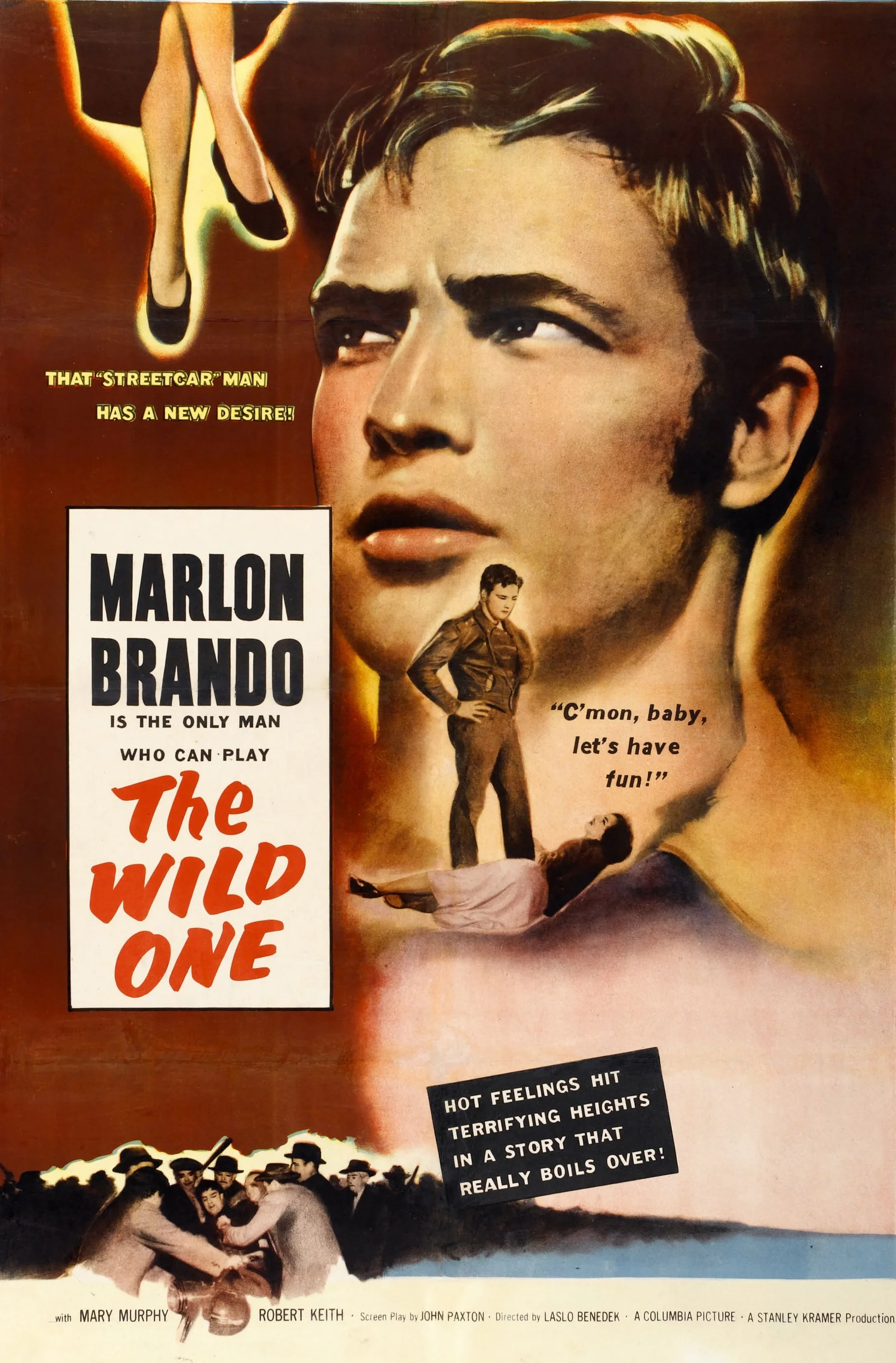 The Wild One is a historical movie because it was influential in starting the trend of outlaw biker
gangs, black leather wear, and sideburns. Marlon Brando is very good-looking in his outfit. Unfortunately, he
got so attached to Johnny Strabler's persona that he would demonstrate mightily for the rest of his life,
marking the downfall of a supremely talented actor.
The Wild One is a historical movie because it was influential in starting the trend of outlaw biker
gangs, black leather wear, and sideburns. Marlon Brando is very good-looking in his outfit. Unfortunately, he
got so attached to Johnny Strabler's persona that he would demonstrate mightily for the rest of his life,
marking the downfall of a supremely talented actor.
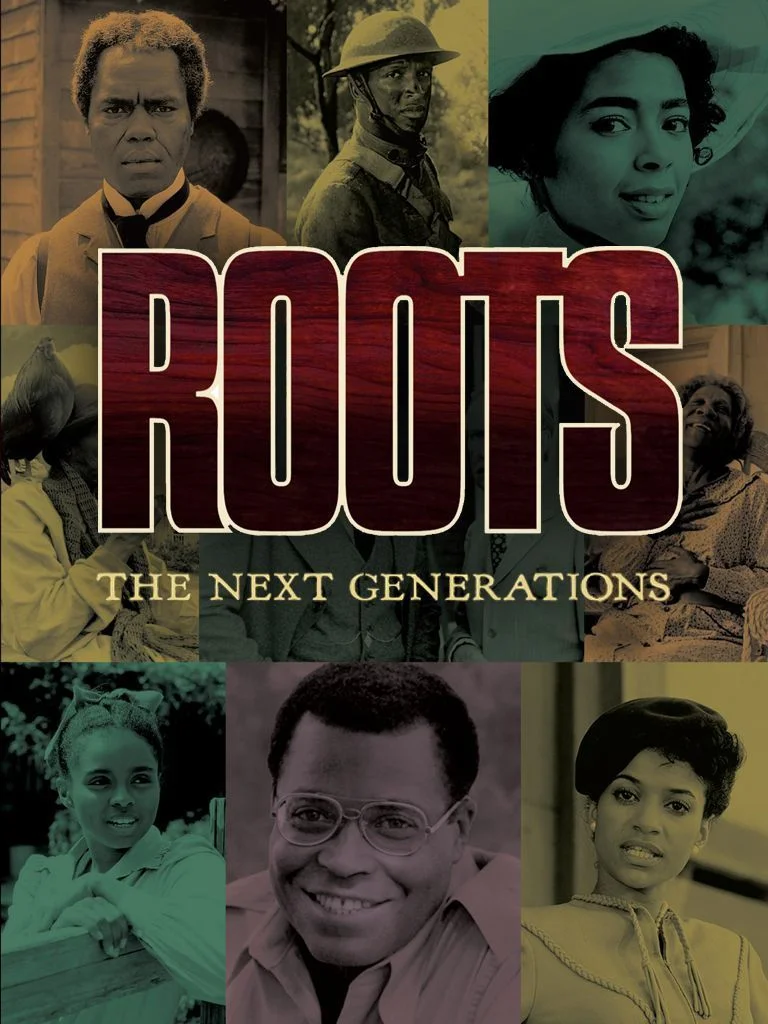 It took over ten hours of waiting to see Marlon Brando, and when it's time for him to speak, he's
brilliant, hence the Emmy win for Best Supporting Actor. How Brando got cast is that, because of Roots'
success, he simply made a phone call out of the blue and asked for a small yet memorable part. It's certainly
right on the money for these two adjectives.
It took over ten hours of waiting to see Marlon Brando, and when it's time for him to speak, he's
brilliant, hence the Emmy win for Best Supporting Actor. How Brando got cast is that, because of Roots'
success, he simply made a phone call out of the blue and asked for a small yet memorable part. It's certainly
right on the money for these two adjectives.
 Don Juan DeMarco is a rare movie with past-his-prime Marlon Brando at his best behavior. I'm sure he did
it as a personal favor to Johnny Depp. Three stories are told at the same time, and the ultimate question is:
is the boy for real? Either way, the fantasy succeeds, and the therapist and his wife are affected by it. That's
all everybody needs to make the romance work.
Don Juan DeMarco is a rare movie with past-his-prime Marlon Brando at his best behavior. I'm sure he did
it as a personal favor to Johnny Depp. Three stories are told at the same time, and the ultimate question is:
is the boy for real? Either way, the fantasy succeeds, and the therapist and his wife are affected by it. That's
all everybody needs to make the romance work.
 It's perhaps the most infamous film of Marlon Brando's oeuvre by being infatuated with the island Tahiti,
purchasing an atoll for himself, and taking one of the residents as his third wife: Tarita Teri'ipaia. It would
take him ten years to restore his respectability when he appeared in The Godfather. What I love about
Marlon Brando in Mutiny on the Bounty is his sensitivity.
It's perhaps the most infamous film of Marlon Brando's oeuvre by being infatuated with the island Tahiti,
purchasing an atoll for himself, and taking one of the residents as his third wife: Tarita Teri'ipaia. It would
take him ten years to restore his respectability when he appeared in The Godfather. What I love about
Marlon Brando in Mutiny on the Bounty is his sensitivity.
 Believe it or not, Marlon Brando is actually in top form as Peter Quint, the way he moves and looks. It's that
there isn't much of screen time allocated for him. To be fair, it's hard to take eyes off Marlon Brando whenever
he appears. The first hour goes well, and he's a good raconteur. The actor has one nice scene when he's seen
running out the woods to catch up with the carriage for small talk.
Believe it or not, Marlon Brando is actually in top form as Peter Quint, the way he moves and looks. It's that
there isn't much of screen time allocated for him. To be fair, it's hard to take eyes off Marlon Brando whenever
he appears. The first hour goes well, and he's a good raconteur. The actor has one nice scene when he's seen
running out the woods to catch up with the carriage for small talk.